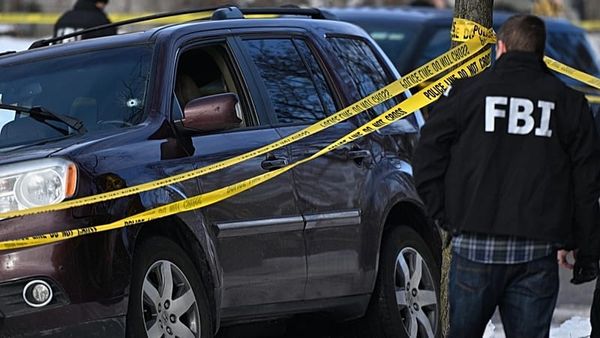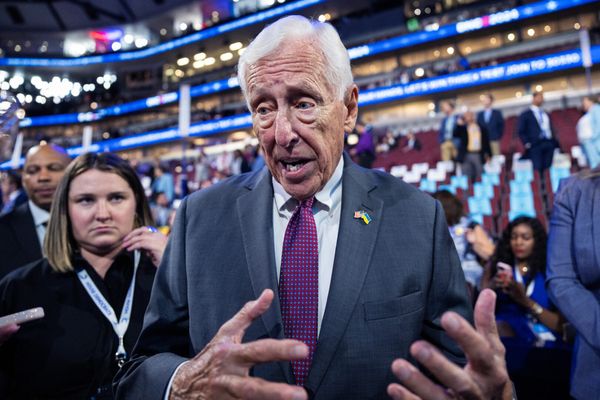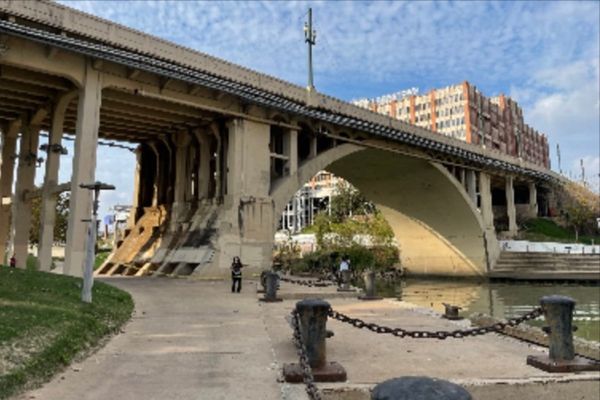
My grandfather went to sea in his mid-teens. He served at the battle of Jutland – the Somme of the sea. In the Second World War, he worked on the Atlantic convoys, bringing food and supplies to a besieged Britain – the Stalingrad of the sea. Shortly after the war, the ship on which he was working as a stoker, the Cydonia, hit a stray mine and he was boiled alive when the engine blew up. The newspapers reported that the ship had been damaged “with the loss of one greaser”. The same phrasing appears in the records of the shipping company. He’s not named anywhere. He was commemorated not as a person but as a component.
Which is how P&O dealt with their employees last week. All ships called in as if they were pedalos on a boating lake; security sent in to remove crews. So here we are, an island nation, our sea lanes closed just when every parish hall and spare room is filling up with toiletries and warm clothing that people were hoping to ship to Ukraine. The companies in Jason Reitman’s film Up in the Air outsource uncomfortable sackings to a “corporate downsizer”, played by George Clooney. That seemed far fetched at the time but P&O didn’t even bother with that. They sacked crews remotely, using a pre-recorded Teams message.
The MP for Dover, Natalie Elphicke, went down to the port to protest. Like your neighbourhood arsonist offering you a flask of tea over the smoking ruins of your house. She was met with shouts of “shame on you” from the sacked workers who understood, as perhaps she didn’t, that this is not an aberration. This is the economy going to plan, as clearly outlined in Britannia Unchained, a booklet cut and pasted together by five Tory MPs. (Elphicke, like her whole party, had voted against Barry Gardiner’s fire and rehire bill which might have prevented this.) It’s a short book but if you read it you’ll see that a decent editor could have got it down to one sentence. “When we seek to protect the vulnerable we limit the freedom of the rich and the privileged – and that is a disgrace.”
It’s a wretched read – a series of assertions and hunches freed from the chains of argument or evidence, with the intellectual rigour of a YouTube conspiracy rant. The prose occasionally soars to the level of clickbait, as in its most famous sentence: “The British are among the worst idlers in the world.” Most of its authors are now cabinet ministers in a government that no one would call exactly Stakhanovite.
The transport secretary – who goes by the name of Grant Shapps and is not one of the infamous five – wrote a stiff letter to the CEO of P&O but was too exhausted by the effort to look up the chap’s name and addressed it to someone who had retired a while back.
The chains from which the booklet’s authors want to free Britannia are, of course, those of regulation. The heroic age of regulation began at sea with Samuel Plimsoll’s attempt to govern a shipping industry that had lobbied against laws to forbid overloading and lobbied for laws that imposed prison sentences on sailors who refused to join unseaworthy ships.
Nicolette Jones’s brilliant biography of Plimsoll, The Plimsoll Sensation, points out that the tactics used against him were both vicious and familiar. “Plimsollism is terrorism,” ran one headline. The royal commission that was eventually established was deliberately swamped with “evidence” about the impossibility of ever establishing a standard load line. It would just have to be left to the wisdom of shipowners, one of whom, the honourable member for Plymouth, was the owner of three ships that had been lost with all hands and two others that had been abandoned.
It was simply cheaper to price in the deaths of thousands of crew than to sail safely. There’s a school of thought that the market will make P&O suffer for its bad behaviour, that customers will be appalled and not use them. It’s true that the market does regulate the market, but it does so through catastrophe. It took the death of 80, many of them children, in a rail crash in Armagh in 1889 to make the case that train companies should be legally obliged to have brakes on carriages. In the 1870s, The Daily Telegraph revealed that one train guard had been found asleep on the job towards the end of a 40-hour shift. The company had instructed the porter to nudge him awake whenever he dropped off.
We are immediately angered by the casual sacking of British crews but we need to remember that the point of sacking them is to replace them with Filipino crews who can also be treated – like that guard – as components.
We’ve allowed a narrative to take hold in which regulation is seen as the enemy of the individual. Indeed, we’ve elected a prime minister who made his name as a kind of anti-regulation Roy Chubby Brown.
But historically, regulation is how we have established the importance of the human in the face of the machine. It’s how we care for each other. It’s always a fight. My friend, Michael Molloy, died in his teens when the coach he was travelling on crashed. The coach’s tyres turned out to be older than he was. When his mother fought for regulation, the bill she campaigned for was thrown out by Chris Heaton-Harris, the current chief whip.
P&O is the logical outcome of the assault on the rules-based world that we tried to build after the war. It’s a campaign for disconnection. Clooney’s character in Up in the Air finds that he has somehow exchanged his own ability to make relationships for a pocket full of air miles. He wanders the world like an oligarch’s super-yacht – always voyaging, never docking, in perpetual and pointless motion. All at sea. At our best we hunger for connection – it’s why we wanted those ferries to take that warm clothing to Ukraine. Shortly after he was elected pope, Francis went to see the refugees in Lampedusa and talked about Lope de Vega’s play Fuenteovejuna, in which an entire town gets rid of a tyrant of a governor by murdering him. All the inhabitants are complicit so none of them has to take responsibility.
The former Peninsular and Oriental Steam Packet Company is now owned by DP World – a “logistics solutions” organisation based in Dubai. Its power is rootless, mobile. The management of P&O distanced themselves with tech, as though they were mere functions of their own software. Components. The chains that Truss and Raab and Patel are trying to cut are the chains that bind us to each other. The chains that tell us that we too are involved in catastrophes like Ukraine or the drownings in the Mediterranean. Cut those chains and we are all diminished.
My grandad’s name by the way was Thomas Boyce.
Frank Cottrell-Boyce is a British screenwriter and novelist







